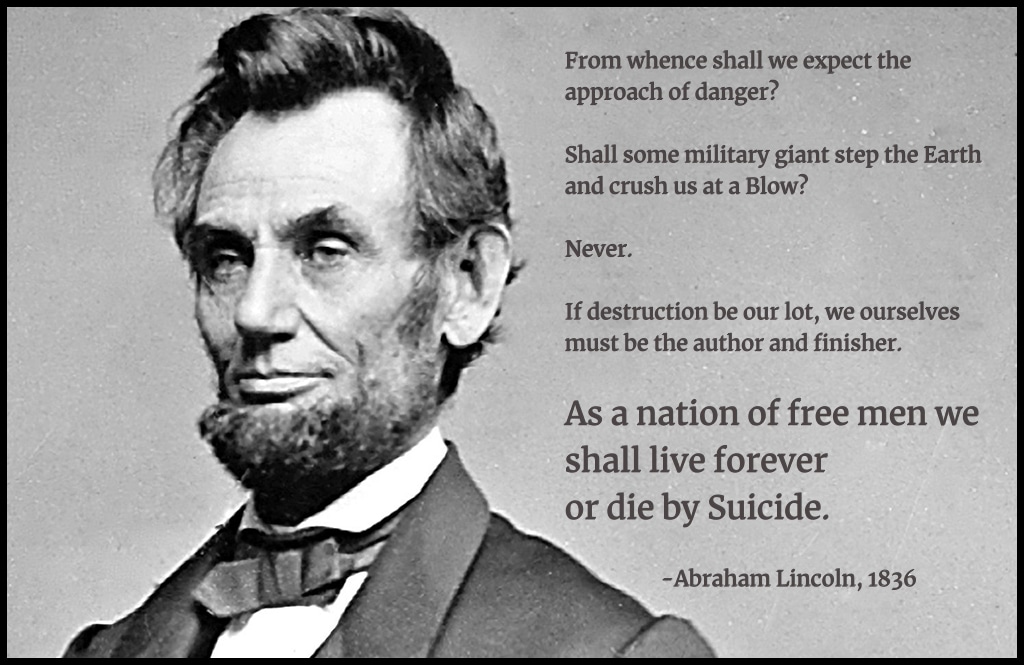Victims Place Blame; Owners Find Solutions:
A quest to use Tom Coburn’s inspiration and God’s power to reform our United States Congress
“From whence shall we expect the approach of danger? Shall some trans-Atlantic military giant step the earth and crush us at a blow? Never. All the armies of Europe and Asia…could not by force take a drink from the Ohio River or make a track on the Blue Ridge in the trial of a thousand years. No, if destruction be our lot we must ourselves be its author and finisher. As a nation of free men we will live forever or die by suicide.”
President Abraham Lincoln
Journal Date: January 1, 2021
The effort that I have come to call “Unity,” which is short for the non-profit we formed named “Unity above Self in America,” is simultaneously both common sense and preposterous. As an attempt to explain it, document it, and further its work, I sit down to write.
The effort has deeply held convictions about what it means to be an American. I feel these deep frustrations from a lack of faith in action from fellow Christians (particularly those holding public office) and deep fears about where my common sense tells me America is headed unless drastic changes are made.
Our Congress manages the financial affairs of our country, and they have done a terrible job. They have put us trillions of dollars in debt, and it keeps getting worse at an ever-increasing rate.
I would tell anyone that if you wanted to wreck your own life, your family’s life, your company, or your country, there is no more sure way than to bankrupt it. To knowingly lead oneself or one’s organization into bankruptcy is an act of cowardice based on fantasy.
Yes, one could reasonably look at America and decide that we are committing the “national suicide” Lincoln warned us of.
I would ask anyone reading this to look seriously at our national debt by going to www.usdebtclock.org and forcing yourself to spend a few minutes with the truth.
See for yourself that America is the most indebted nation in the world. Notice how America has more than three times the debt of China but only a fifth as many people. Look carefully and notice how when our unfunded liabilities associated with Social Security and Medicare are taken into account, our debt rises from a sickening $28 trillion to a mind-blowing $161 trillion.
Notice how your eyes soon glaze over as you watch our debt grow at a rate of more than two million dollars per minute. I promise you will come away with a sober mind and likely feel that “something must be done” as I do.
To lead oneself or an organization away from financial collapse means acting with courage to face the truth. This is an effort to do precisely that.
The effort is preposterous because it assumes that somehow one person in a small town in central Oklahoma with no wealth or influence to speak of can somehow, through straightforward, determined, and focused steps, miraculously begin a movement that starts to address perhaps the most significant problem of the wealthiest nation of the world.
The issue has worldwide implications indeed. The debt problem could bring down the entire system of government in America. If that happens, we can all agree that it has worldwide implications.
The effort is entirely common sense in that it is based on the most straightforward concepts, basic yet powerful concepts. One of these concepts is that if a person sees a problem affecting the public good, they should do whatever they can to correct it.
Another would be that whatever is the cause of a problem (in this case, Congress) can be redirected to be the solution to the problem. Another would be that people are selfish and will do what you incentivize them to do with their pay structure.
This story, like most stories, is tied to and influenced by many things that pre-date the story itself. Let’s take a look at some of those tie-ins and influences.
Patriotism is a prominent influencer. I believe all Americans exhibit, at least some and most, a strong sense of patriotism. I, like most Americans, have no military service. My father was a WWII veteran, and indeed, that influenced me.
The more significant issue, though, is we know people have fought and died for the freedoms we enjoy. Perhaps, even more, compelling is the fact that people continue (my wife and I, for example, have two sons serving in the military) to volunteer to put their lives at risk for our freedom.
This understanding of what one person can do and what is appropriate has to be viewed through the lens that many have given their lives for our benefit. Many are risking their lives for our benefit even today.
It is very humbling and puts into perspective how minimal my sacrifice is no matter how hard I work on this cause.
Ownership is a significant influence on this effort. Who owns this country? Surely the one who owns any entity is inherently responsible when that entity is in serious trouble.
Without a deep sense of ownership, one is inclined to feel like a victim of the dysfunction of Washington and Congress.
Sadly, I see too many of our fellow Americans who seem to feel precisely this way and too many loud and angry voices on both sides of the political aisle that reinforce this victimhood to breed distrust and resentment to further their selfish goals.
If, however, one feels that together we all own this country, one is inclined to find or create solutions to our common problems and try to build consensus and shared responsibility to solve these problems.
Christian faith is also a major influence and a source of real power to face the problem. As a Christian fortunate to live in a small town smack dab in the heart of the Bible belt, faith is a big part of me.
It has long bothered me how all Christians tend to gather on Sundays to discuss the high ideals and perfect life of Jesus, only to abandon these precepts when politics are concerned instantly.
Jesus modeled patience, kindness, humility, love for his enemies, and service above self. Our self-described Christian political leaders too often teach and encourage outrage, meanness, self-righteousness, hate for our fellow Americans, and a winner-take-all mentality not for the common good but for political victory over their opponent.
Journal Date: January 3, 2021
Tom Coburn is an American hero, in my opinion. He stands virtually alone as a man who rose to prominence in American politics yet consistently put principle above politics.
Tom would challenge anybody, anytime, because of his unbending commitment to principle. It did not matter who was or was not with him or what party leaders said. He always stood for what he thought was morally right.
In an era where politics is intensely divided, leaders regularly endorse virtually anything if it serves their party or furthers their political goals. Tom was an exception.
In modern politics, we have come to expect our elected U.S. representatives and senators to try their best to do things that pander to the electorate to put themselves in the best possible position for re-election.
Tom would have none of it. Tom fought unnecessary spending at every level. He consistently refused to pander to his electorate by fighting against wasteful projects in his district and across the nation.
It made him plenty of enemies but also earned him broad respect on both sides of the political aisle.
He pointed out that members of Congress take an oath to serve the nation, not their state or district. He called any vote or decision by a member of Congress intended to put themselves in a good light at home but not in the nation’s best interest “corrupt.”
He used strong direct language and ruffled many feathers.
In summary, one has to see Tom as a paradox. He accomplished, seemingly without trying, what every politician desires: universal respect, broad admiration, and easy re-elections. Yet he did these things without the ordinary politician’s standard methods.
Methods that include but are not limited to avoiding taking positions on tough subjects, changing positions on moral matters when it becomes politically expedient, bending to the will of party bosses, courting political favor by taking stands favored by one’s party contrary to principle or seeking projects to “bring home the bacon” to gain favor among voters.
He did the opposite by attacking both parties and colleagues, if necessary, to defend principles. Rallying against politically popular “pork” projects even at home, never bending as the political winds shifted.
In understanding Tom, one must consider his faith. Tom signed my copy of his last book, “Smashing the D.C. Monopoly.” He included the inscription from Matthew 6:33.
“But seek first his Kingdom and his righteousness, and all these things will be given to you as well.”
That is what Tom modeled for us. He sought first what was best for the nation and to morally stay true to sound principles. Then everything politicians seek, such as respect, admiration, and re-election, came to him without his having to seek them.
Coincidence? I don’t think so. Divine intervention and intention – it seems to be exactly that to me.

